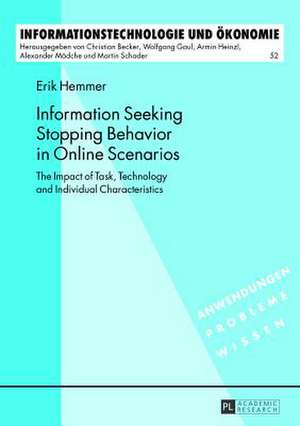Information Seeking Stopping Behavior in Online Scenarios: Informationstechnologie Und Oekonomie, cartea 52
Autor Erik Hemmeren Limba Engleză Paperback – 25 aug 2013
Preț: 423.98 lei
Preț vechi: 460.85 lei
-8% Nou
Puncte Express: 636
Preț estimativ în valută:
81.13€ • 84.93$ • 67.13£
81.13€ • 84.93$ • 67.13£
Carte tipărită la comandă
Livrare economică 02-08 aprilie
Preluare comenzi: 021 569.72.76
Specificații
ISBN-13: 9783631643525
ISBN-10: 3631643527
Pagini: 234
Dimensiuni: 149 x 208 x 17 mm
Greutate: 0 kg
Ediția:Nouă
Editura: Peter Lang Gmbh, Internationaler Verlag Der W
Seria Informationstechnologie Und Oekonomie
ISBN-10: 3631643527
Pagini: 234
Dimensiuni: 149 x 208 x 17 mm
Greutate: 0 kg
Ediția:Nouă
Editura: Peter Lang Gmbh, Internationaler Verlag Der W
Seria Informationstechnologie Und Oekonomie
Notă biografică
Erik Hemmer was born in 1983. In 2008, he completed his studies of Information Systems at the University of Mannheim. Between 2008 and 2013, he conducted the research that underlies this book at the University of Mannheim as a doctoral student and research assistant at the Chair of General Management and Information Systems of Prof. Dr. Armin Heinzl. In 2012, the author was a visiting researcher at the Texas Tech University.
Cuprins
Contents: Human computer-based information behavior ¿ Information seeking stopping behavior in online contexts ¿ Psychophysiological research approach ¿ NeuroIS ¿ Empirical research ¿ Theory development ¿ Impact of social richness ¿ Social media.
























